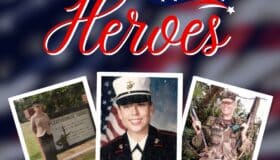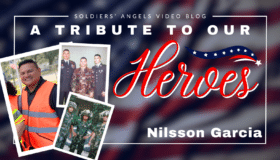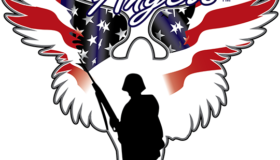A Tribute to Our Heroes: Army Veteran Darrin Domko
August 4, 2022
In this latest episode of our video series, “A Tribute to Our Heroes,” we talk with Army veteran and Soldiers’ Angels volunteer Darrin Domko.
Darrin shares about the impact of receiving cards and packages while deployed, how he continues to find purpose after retirement, and how he toured the country to thank all his pen pals who wrote him while he was deployed.
View our video interview with Darrin below.
Video Interview with Darrin Domko
Q. When we talked earlier, you told me that the mission of Soldiers’ Angels hits close to home. While you were deployed to Iraq in 2003, you and your soldiers received cards, letters, and care packages from more than 100 pen pals. How did those messages of support impact you?
Darrin: Well, let me start by saying it was 225. When I was in Desert Storm in ‘90, it started there and I had 115 [pen pals]. Then by the time I was in Iraq in 2003, it had grown to 225, which it was great for me, because when I would be on break … I guess you could say you’re never on break in war… but when you’re on your little free time, you have limited things you can and can’t do. It’s not like you can just go out and play football. You know, that’s not a safe thing to do. But people would write letters, and the chaplain would come around with any soldiers’ letters, and I would see children’s handwriting on some, or I’d see a child’s name, but a parent’s handwriting, and I always thought what wouldn’t be so cool if I ever wrote somebody, and they wrote me back that didn’t even know me. And so I started with that. I started writing children, and they would ask questions, and I would answer them.
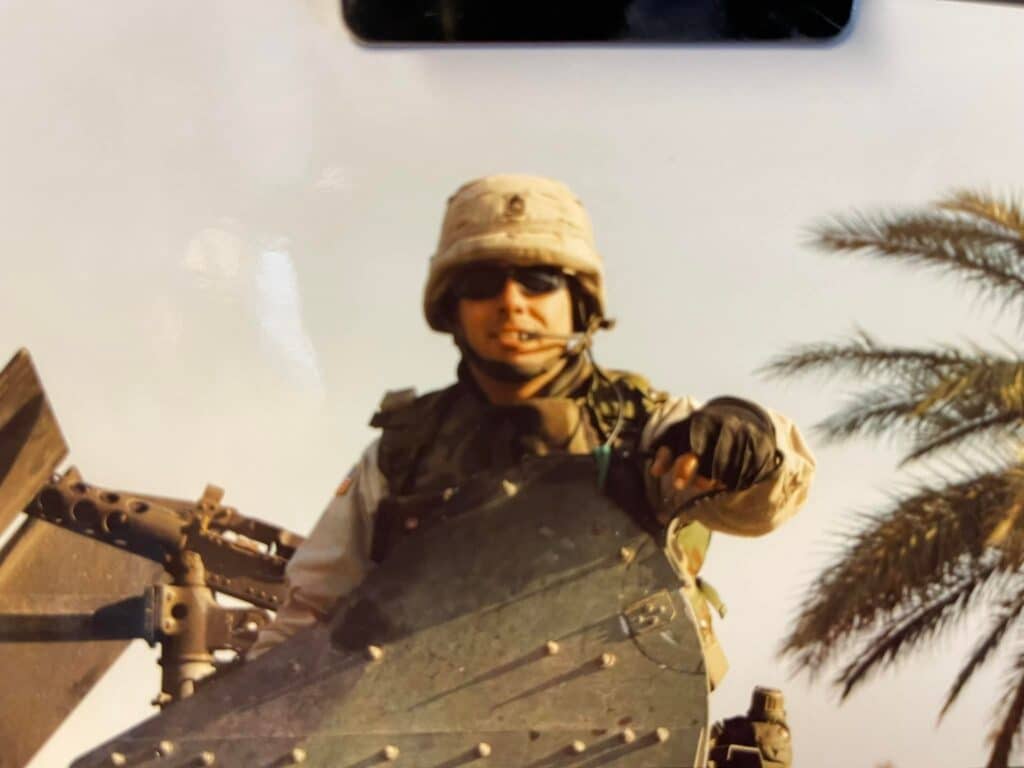
It just was so fun to take a break from what we were doing in the job to just be a human being, a normal person. You know, when we’re there, we’re expected to be a tough, hard soldier. But when I would get these letters and cards, it was just a time of relaxation. And I enjoyed it. I had family writing too, but the problem was we didn’t have the technology that they have today. So letters could take anywhere from two to three weeks, and then two to three weeks to come back. So sometimes you were sitting around waiting six weeks for the reply from somebody. And on that note, the more people I wrote, the less downtime I’d have waiting on a letter. And I enjoyed it. It made me feel important, because I thought, “Who would care about a high school dropout with a GED?” And these people did. They loved me for being a soldier. And it made me feel good as a person made me want to fight harder, made me want to stay longer, because I was doing something that mattered.
Q. How did how did people react when they received a response letter from you?
Darrin: Oh, my goodness, I wish I could have been a fly on the wall when it happened. Because the responses and the outpouring were amazing. I had parents that were writing me about how much they appreciated me. The kids’ letters being written back to the point where some of them were like, “Hey, if you don’t have a card to call me, call us collect.” Do you know how expensive it is the call from Iraq to the States collect? It’s pretty expensive. And but they still let me and then they started sending me phone cards to be able to call their kids. And boy, I mean, it would make tears in my eyes. These kids and these families just made me feel so good.
Q. You took it a significant step farther than just writing them back, which got a lot media attention. Even President Bush heard about you. What did you do when you returned stateside?
Darrin: Well, when we first came back, I told my wife I want to do something special to show these people how thankful I am. So we decided we take 30 days leave and I took out a loan for $10,000, and we traveled the country [to visit my pen pals]. And the thing was, I didn’t want anybody to spend any money on me. I wouldn’t let them give me any money. I wouldn’t let them pay my hotels or anything. Now, if you wanted me to come to your house for dinner, sure. But I was not letting anybody pay for anything. My return was the happiness and joy that they gave me while I was there.
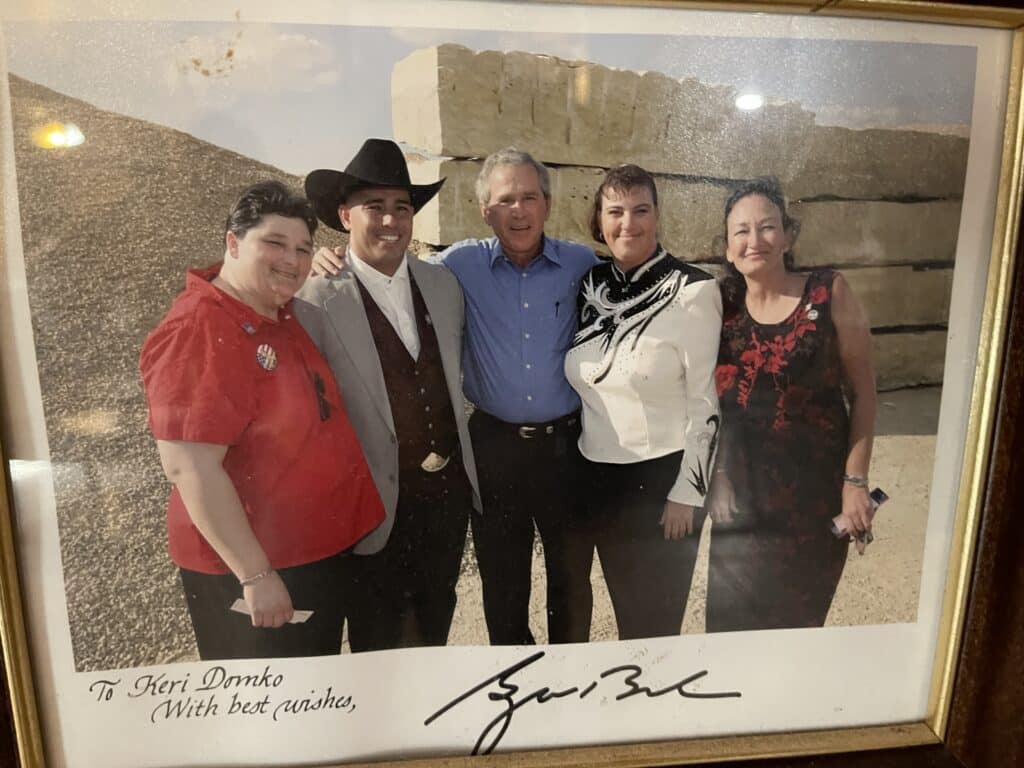
So when we were in Shakopee, Minnesota, and there was a lady named Kim. I told her I was coming to see her. She had her little garage full of care packages. And the media had done an earlier story on her about the care packages to the troops. And during that time when President Bush was campaigning, the assistant to the White House press secretary, Josh, found out I was staying at her house. So he called her and said “We’d like you to meet the President and tell him your story.” [And so during a campaign stop, I was invited to meet the President] and we get to the end little greeting line. And it starts off with people like the mayor and the city officials and first responders. And then it gets to us. And they say, “Mr. President, this is the soldier we were telling you about.” And I looked at him and I go, “Oh, you were talking about me over foreign policy and breakfast? That’s pretty cool.” Because I’m not a shy person. So I didn’t get starstruck when I was talking to the President. You and so we were talking and I brought some pictures of the stuff we had done in Iraq, the good stuff, the stuff that the media doesn’t want you to see. They want to see blood and guts because that sells. I wanted him to show him the humanitarian side that we did that I support it. And so I showed him some pictures. And I said, feel free to use them on your campaign because I fully support what we’re doing, why we’re there. And he said, thank you. And we talked for a good 20 minutes.
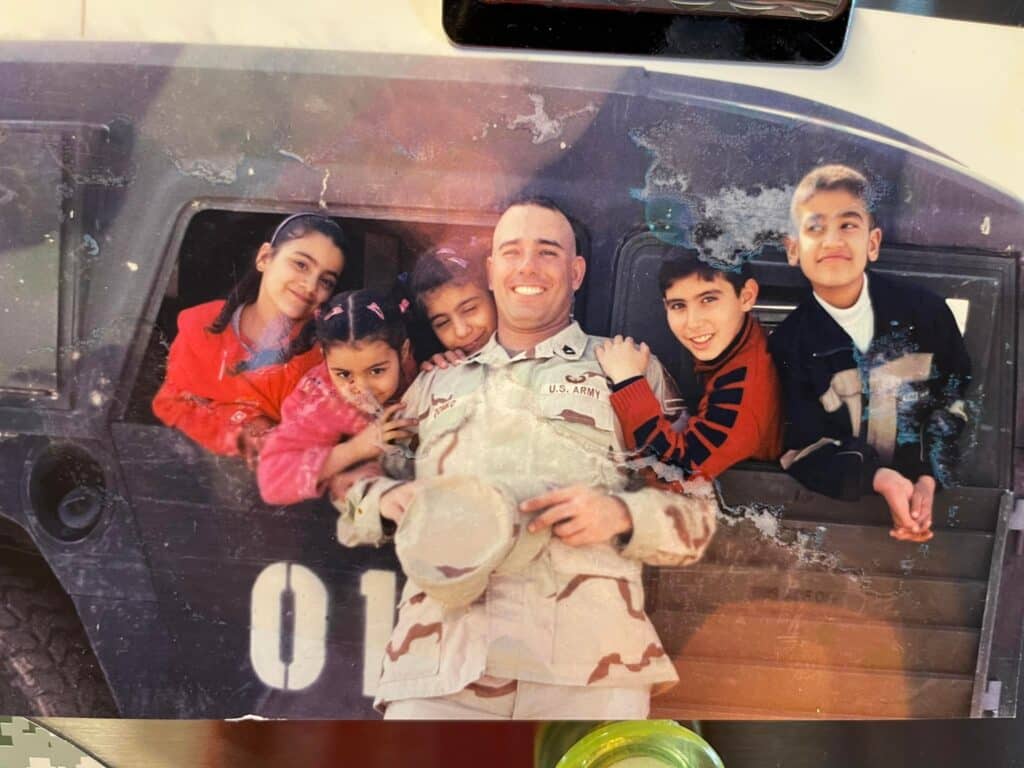
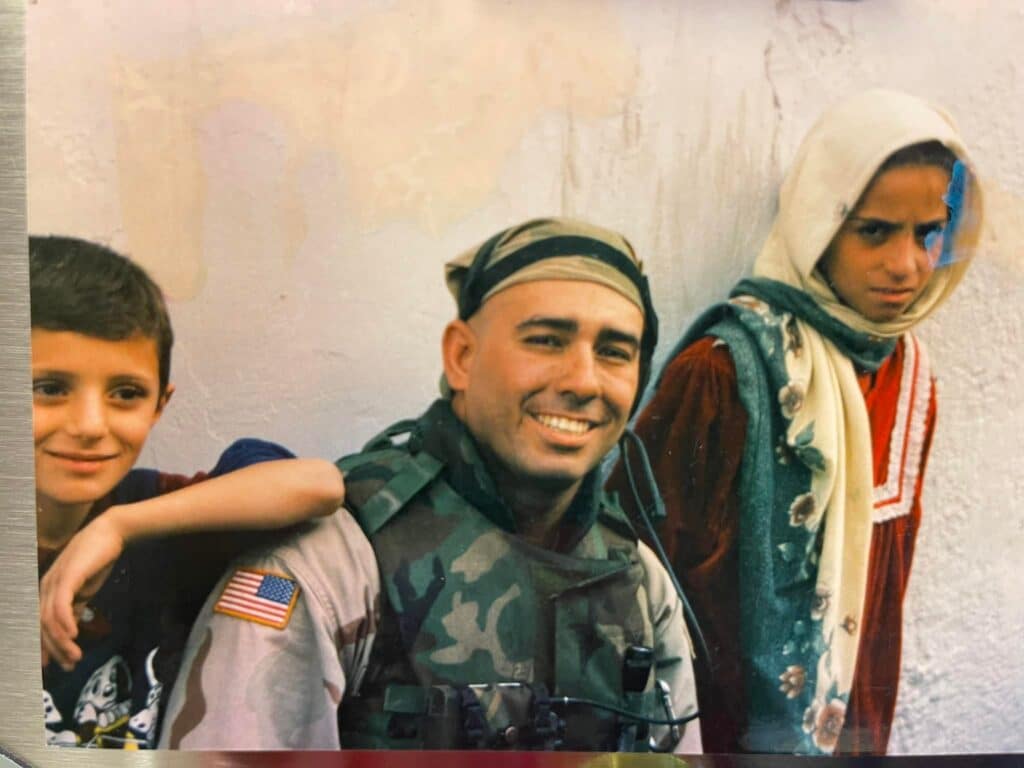
Darrin (cont’d): [After the event, Josh, the assistant press secretary] stayed in touch with me. But my son got sick at the end of my tour. And then I told Josh, and Josh told the President, and the President sent my son a get well card to the long term hospital he was going to be in. And then he contacted the Louisiana Governor and told him to make sure I got taken care of because that’s where my son was going to be. So it was a really cool thing, meeting the President and getting to tell him all about the stories. And I made sure he understood that the American people — through organizations such as Soldiers’ Angels — are responsible for my positive impact on our mission.
That you guys, y’all gave me the opportunity to be more positive and happy. You know, when you’re away from your family, you get sometimes you get depressed. And then when you don’t believe in what you’re doing, you get angry, but I never did. And that’s because of Soldiers’ Angels and organizations such as them, keeping me positive and knowing that we were supportive.
Q. Can you tell us some highlights of the positive impact that you were making when you were deployed?
Darrin: When I was deployed, there were a lot of soldiers that didn’t have family. There were a lot of soldiers that joined and didn’t have a good relationship with their family. So they weren’t getting mail. And you know, when Mail Call would come around, I would get about 10 or 12 letters. Then when packages started rolling in, I was getting 15 to 20 packages. So I would share the care packages. And then I started writing back to all the people and saying hey, I appreciate the love and support but I got more than enough. And I will be your friend for forever. However, would you do me a favor and write this person or that person and get to know and I would tell them a little bit about that person, so that they would write a more personal letter. And next thing, you know, it blew up. I mean, I started getting more care packages and letters. And those guys and girls were getting care packages and letters. So it just kept growing, you know, and just kept growing, I even bought shelves to put up all the stuff that I had, because I had my own store of free stuff to give away. And man, it was amazing, you know, the friendships that we’ve made over the years because of it. And it helped a lot of my troops.
Q. Now that you’ve retired from military service, how have you continued your service to the country and your local community?
Darrin: I found purpose. And that’s part of what I do here. Now, when go to the VA, and I see a soldier in uniform at the VA, that means they’re still in service and they have to learn about their benefits. They have to learn about what’s out there for them. I talked to them about how it feels to be out [of the military]. Because when I was a First Sergeant, I was always in charge about a minimum 120 soldiers. So when I don’t have those people to guide, direct, and teach anymore, it gets lonely, but not for me because I participate in all the things they have at the VA. They have meeting groups, they have clubs, that’s how I found Soldiers’ Angels was [headquartered] here in San Antonio, because I volunteered to go to an outing with veterans to do food banks and do pet rescue and pack packages at the warehouse at Soldiers’ Angels.
And so [volunteering] gave me purpose and that’s the first thing I tell soldiers. When you get out. You’re going to be wondering, what do I do now? I don’t actually affiliate with any specific organization, because they have plenty of good people working for them. I like to get those people that fall through the cracks because a lot of veterans don’t have patience. So I like to talk to them, and try to give them hope, and find a bad situation and show them the one positive thing in it. Even if it’s something as conceited as me saying, “Hey, man, you know, you’ve had a tough time, but you met me. And I can help you. So there’s a positive out of all this crap you had to go through.”
You know, civilians don’t always quite understand what we’ve been through. And they may understand it through reading books. But unless you actually experience some of the things that we’ve experienced, it’s not the same. So talking amongst your own actually helps a lot more to you know, we do appreciate all those trained doctors and stuff. But when we talk to each other, it’s a little bit easier sometimes. So that’s what I do. I spread the message. And my daughter who sees all these things, I told her well said you need volunteer hours to graduate from high school, let’s do something that makes a difference. So we are going volunteer at Soldiers’ Angels on a regular basis in between my daughter’s super busy schedule, whether it be care packages, or something else that they’re doing, or whatever, whatever they want to help.
Because the one thing that I left out earlier that I wanted to share with you about Soldiers’ Angels, this is probably the greatest thing that ever happened, aside from when I was deployed, was Patti [Patton]-Bader, the original founder of Soldiers’ Angels, I was one of her original soldiers. When I got assigned from Germany to Texas at Fort Bliss, we had trailers in a big sand bowl like we were deployed again, because they were building new structures for us. And one of my trailers was my soldiers’ day room. Well, it’s illegal for soldiers on active duty to solicit for donations. So I said [to Patty] let me show you what we have here. So I took a picture of an empty day room with a broken ping pong table, and a couple of chairs and a couch. I said, yep, this is ours. This is where my guys get to come and relax. Well, Patti understood the message. And so all of a sudden I received three TVs from Soldiers’ Angels, I received three Xbox systems. I received board games, decks of cards, writing paper, snacks, all kinds of cool stuff from Soldiers’ Angels. And it was great for morale.
Q. Before I let you go, I want to ask what it means to you to be a veteran?
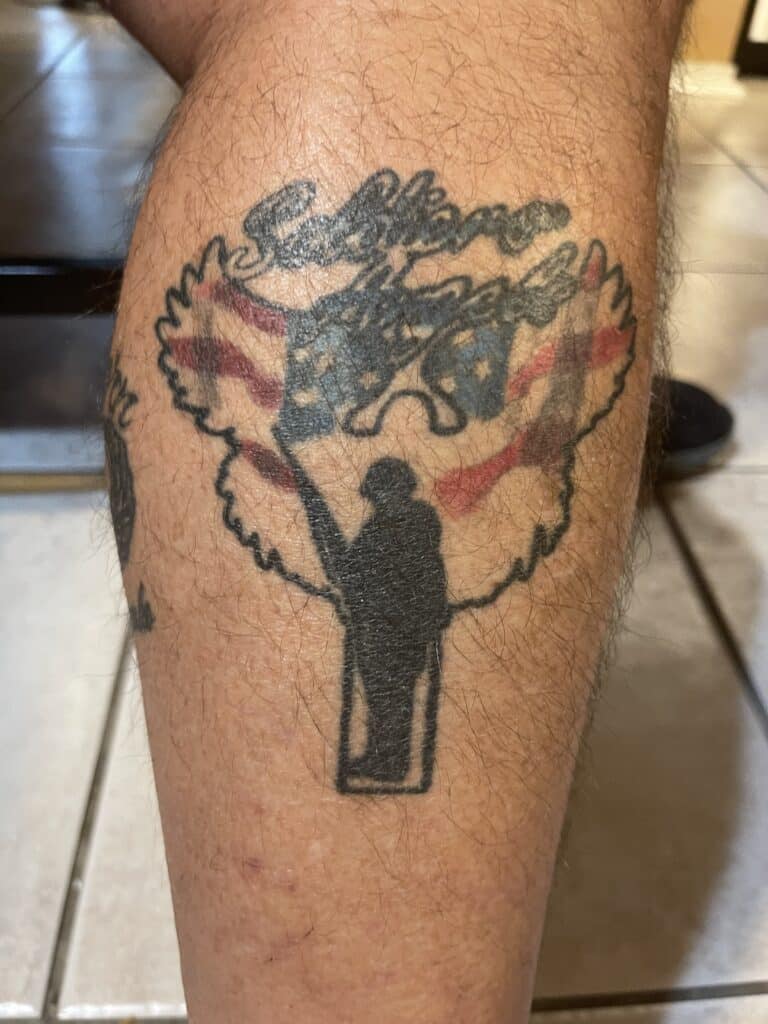
Darrin: Wow. I am so proud to be a veteran because it started with grandma and grandpa and World War II and my uncle in Vietnam. You know, I was always raised around the military. I remember grandpa marching me and my sister when we were like five and six years old to the bar that he would go drink beer while we shot pool. And then my uncle from Vietnam, he’s a member of the American Legion. And he was the commander at one time. So getting in a room with a bunch of veterans, and they’re talking about their experiences. And they’re sharing them with me, because I was a soldier, because the things that veterans talk about, don’t always get to go to civilians, because in their mind, you don’t understand. And whether it be a sad situation that makes them cry, or a happy situation that makes them cry. You know, veterans at that place would tell us, and I was like, oh, wow, this is so interesting. This is so cool. I hope someday I can be a soldier too, which affected both my sons, they were both like, wow, this is so cool. And they were proud.
So for me, now that I’m an actual veteran, I’m proud that my boys have done the same thing. So it’s just a matter of pride, that there’s still good things in the world that can make you feel good instead of drugs, or alcohol. You know, it that’s what me being a veteran to me is that pride, that selfless pride of doing stuff for others without expecting anything in return.
